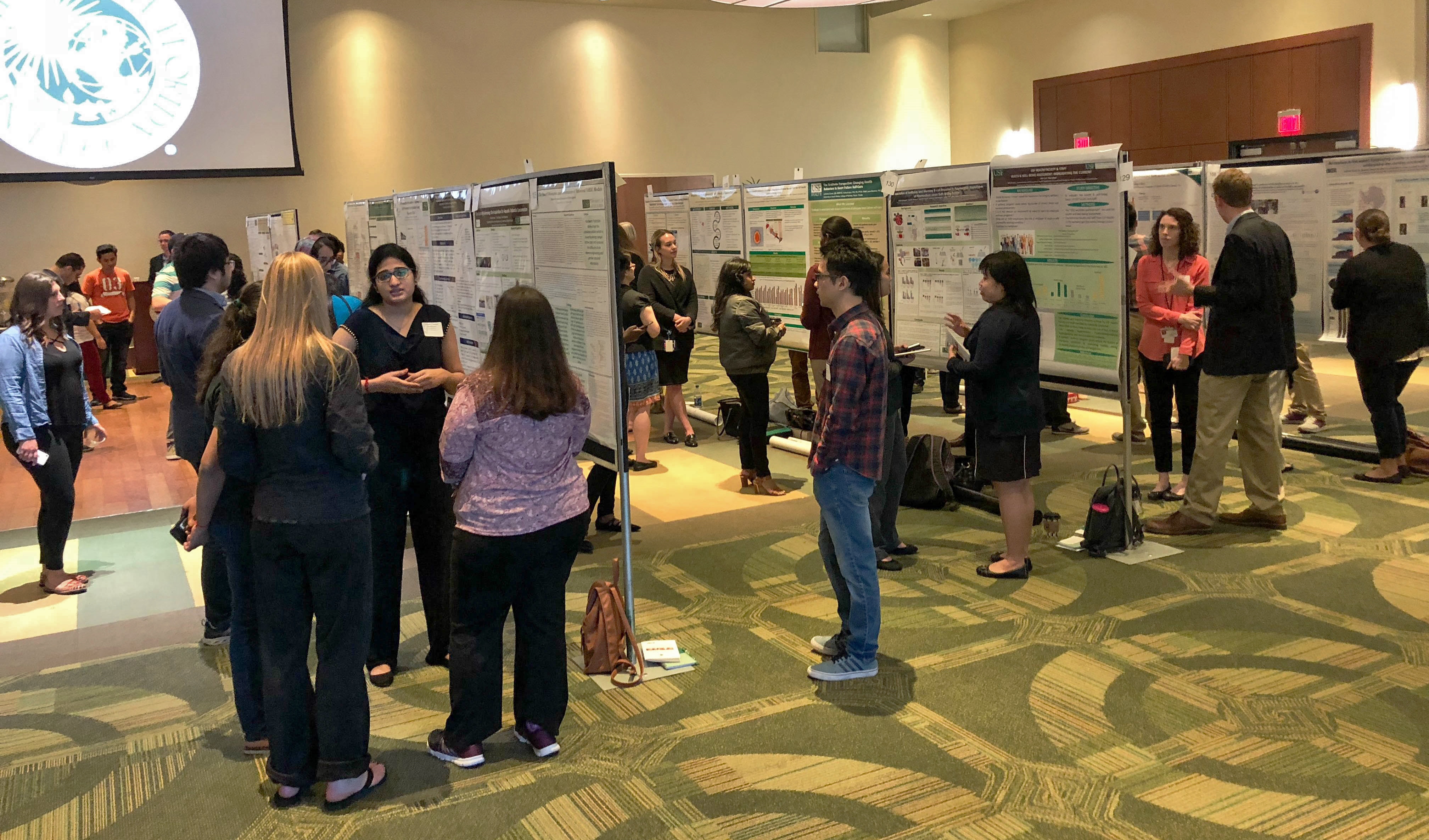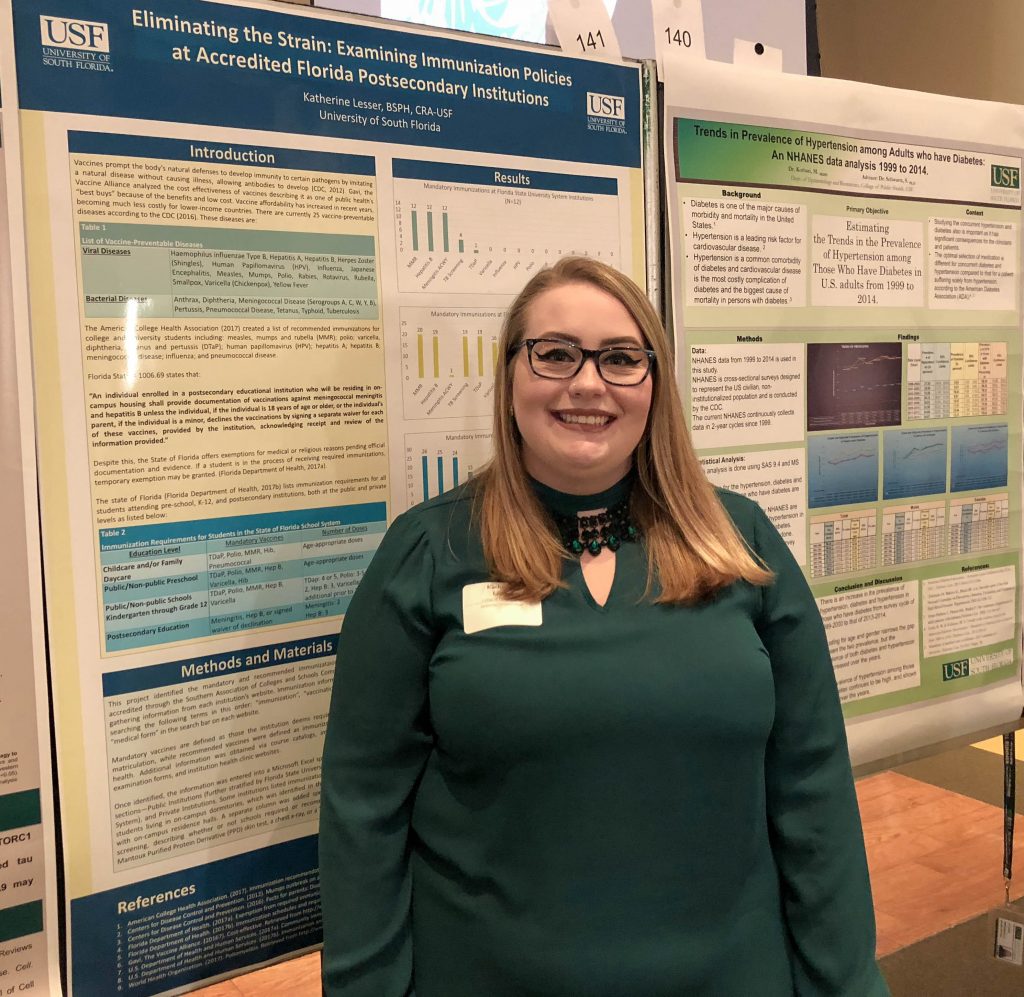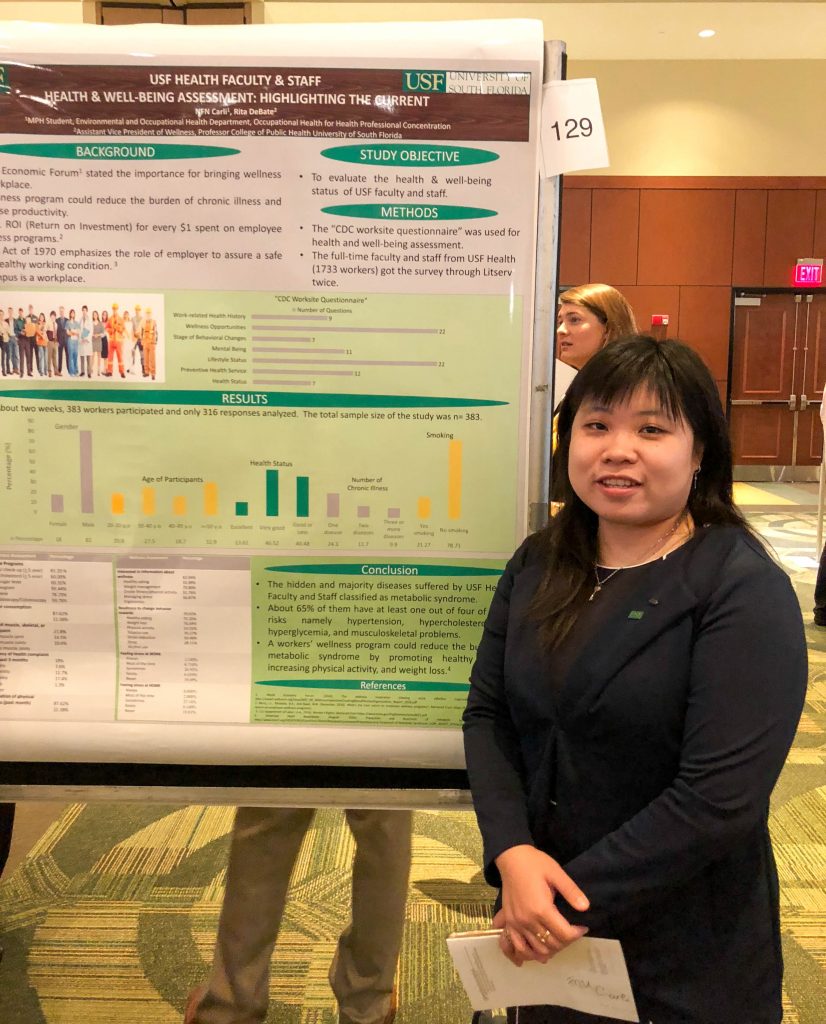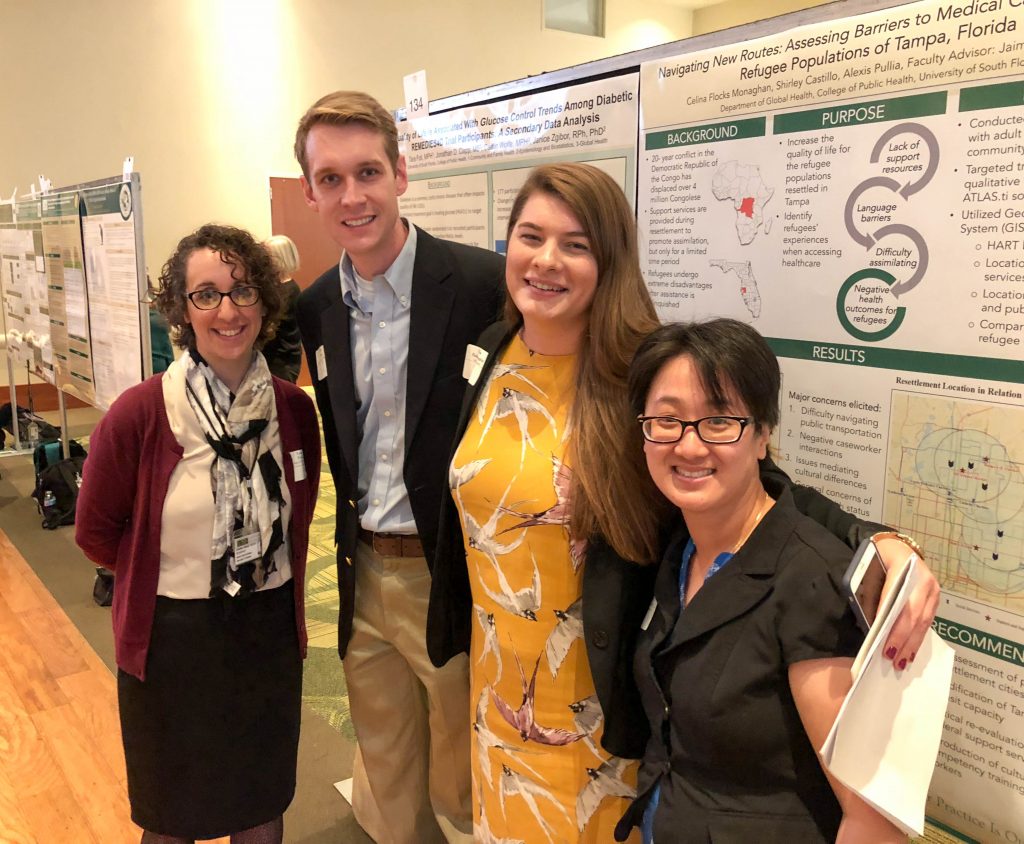From vaccinations to occupational health, students showcase their public health passion
The USF Office of Graduate Studies presented its 10th Annual Graduate Research Symposium on March 21 at the Marshall Student Center.
The event, sponsored by the Graduate and Professional Student Counsel and Research One, showcased graduate students across all disciplines. This year, 17 USF College of Public Health students participated.

The Graduate Research Symposium took place in the Marshall Student Center and included students from all disciplines across campus. (Photo by Caitlin Keough)
MPH student Katherine Lesser’s research, “Eliminating the Strain: Examining Immunization Policies at Accredited Florida Postsecondary Institutions” examined the discrepancies in immunization requirements for students at universities and colleges in Florida.
“I wanted to see if any of the Florida colleges had any of the same immunization policies,” she said.
Lesser, specializing in epidemiology and global communicable diseases, examined some of Florida’s laws stating that individuals at post-secondary institutes with on campus dwellings need to be vaccinated against meningococcal, meningitis, and hepatitis B unless they opt-out with a waiver.
“I thought that was interesting because another Florida statute for students entering daycare through post-secondary education, including childcare, daycare, pre-k and k-12 vaccines, require much more than meningitis and hepatitis B,” Lesser said.

Katherine Lesser. (Photo by Caitlin Keough)
Lesser segmented the universities and colleges in Florida by accreditation, looking specifically at those accredited by the Southern Association of Colleges and Schools Commission on Colleges, and split them even further between public and private institutions.
She conducted research of each institution’s vaccine requirements for incoming students.
“Most had immunizations forms, the only ones I found that didn’t were seminary schools,” Lesser said.
She found that Florida college systems had vaccination requirements, but that they were very specific to those in the health science professions.
“There is a lot of variation that exists between the schools,” Lesser said. “Not one institution has the same as the other, which I find very concerning especially because these are all highly contagious diseases that can be prevented by vaccines.”
She also found that the 12 Florida State University System institutions required hepatitis and meningitis by law, and that four required a TB screening for international students where TB is endemic.
“I suggest that the state of Florida create a cohesive immunization sheet that is used throughout all colleges and universities. From what I understand, no one institution has the same as the other and that is a huge issue,” Lesser said.
Vaccination is Lesser’s public health passion and in February, she, along with other classmates, went to Washington, D.C. to speak with Florida’s congressional members and senators regarding the need for continued funding and global support for the UN Foundation’s, Shot@Life, an organization advocating for childhood vaccines worldwide.
“Vaccines are such a vital part of public health, everyone should get them and support them,” Lesser said. “I want people to understand them, especially since they are like a ‘best buy’ of public health, as The Bill and Melinda Gates Foundation describes them. Most are affordable and with vaccines we’ve made so much progress, for example, Polio is only endemic in three countries. So, it’s clear that vaccines do so much good for the world and it’s an incredibly important topic.”
For environmental and occupational health graduate student Carli, her research, “USF Health Faculty & Staff Health & Well-being Assessment: Highlighting The Current” was driven by a personal experience.
“Occupational health and safety is my passion,” Carli said. “I have three years of experience working as a physician in my home country [Indonesia] where my best friend’s father developed thyroid cancer because of working in a fertilizer factory. Within two years of his retirement date, he found out he had cancer. He assessed that many of colleagues had the same issue. Occupational related diseases always happen near retirement, but after you end up with the issue there is not much that can be done because it’s already late.”
She decided to assess the health and wellness of USF Health’s faculty and staff.
“University workers don’t realize it, but they are workers too,” she said. “The University is a workplace and the federal government’s OSHA department says that it is an obligation for the employer to take care of the health and wellness of the employees.”
Using the CDC’s worksite questionnaire of 90 questions, Carli assessed the health and wellness of the workers and found that, overall, USF Health is taking strides in addressing employee wellness.
“Most of the workers of USF Health are entering their later years of life and are over age 50,” she said.
The four common complaints noted by USF Health employees were: hypertension, hypercholesterolemia, hyperglycemia—high blood glucose, and musculoskeletal issues.

Carli. (Photo by Caitlin Keough)
Carli assessed that staff also stressed the desire to have classes on physical activity, healthy eating, and ergonomics.
“This is the one department that allows its workers to access the recreation center at the WELL. In other departments at USF employees must pay to utilize the recreation center, but at USF Health it’s accessed for free. I really appreciate that USF Health thinks about the health and wellness of the workers,” she said.
She said she found that USF Health has done a great job addressing those desires and hopes the same wellness efforts will be offered to employees across campus.
“I hope that later USF as a whole will provide the opportunity its staff and faculty to use the gym,” she said.

(Photo by Caitlin Keough)
The complete list of College of Public Health participants include:
Student Affairs and Student Success
Taylor Grimm
Success and Wellness Coaching: Holistic wellness approach to student success
Environmental and Occupational Health
Carli
USF Health Faculty & Staff Health & Well-being Assessment: Highlighting The Current
Community and Family Health
Melody Chavez-Robben
Quality of Life among Hispanic Cancer Survivors
Alexis Barr
Promoting and Supporting Breastfeeding in the Hospital: Factors Associated with Exclusive Breastfeeding at One Month among WIC Participants
Janelle Barrera Ikan
School-level Factors Associated with Obesity: A Systematic Review of Longitudinal Observational Studies
Tara Foti
Quality of Life is Associated With Glucose Control Trends Among Diabetic REMEDIES4D Trial Participants: A Secondary Data Analysis
Lydia Mezenghie
Colorectal Cancer Screening among African Americans
Chinyere Reid
Improving Florida’s Birth Certificate Accuracy: A Pilot Initiative
Acadia Webber
Food, Nutrients, and Diet Quality in Children with Autism Spectrum Disorder in Florida
Global Health
Celina Flocks Monaghan
Navigating New Routes: Assessing Barriers to Medical Care in Congolese Refugee Populations of Tampa, Florida
Siriuk Changrob
Association of Immunologic Memory to Polymorphic Haplotypes of Plasmodium vivax Duffy Binding Protein in Low Malaria Transmission Area of Thailand
Muhammad Khalid
Heterologous expression and purification of Plasmodium falciparum protein kinase ABCk2 (PfABCk2) as a potential drug target
Asmita Mhaskar
Homeopathy: What are patients saying?
James Muncy
Perceptions of Zika Virus Among USF Students
Epidemiology and Global Health
Katherine Lesser
Eliminating the Strain: Examining Immunization Policies at Accredited Florida Postsecondary Institutions
Epidemiology and Biostatistics
Linh Duong
Assessing Hepatitis C Screening Completion Rates Using Electronic Medical Records from the USF Health System in Tampa, Florida
Mitra Kothari
Trends in the Prevalence of Hypertension Among Those Who Have Diabetes in U.S. Adults: An NHANES Data Analysis
Related Media:
Photo album by Ellen Kent
Story by Anna Mayor, USF College of Public Health
